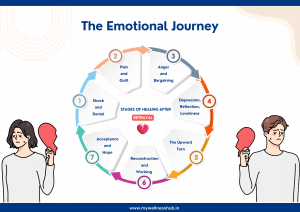How to deal with lies in a Relationship?
By Prapoorna M
Last Updated: November 5, 2022
It is a common scenario to see someone or the other lying in our daily lives. Nobody bothers if this is a white or harmless lie. But what if our partner lies to us often? What if the relationship gets strained because of these lies? What if your peace is lost? Yes, lies in a relationship are a severe matter of concern that should be addressed. In relationships, men and women do not always tell the truth. People do lie to avoid issues, to fulfil some necessities, and also to cover their mistakes. In our daily lives, we find that lies in relationships are told out of habit or just-like-that. Couples need to strike a delicate balance between honesty and personal convenience. They call it the art of compromise.

Couples, if they have to, they primarily lie deliberately with conscious deception to achieve goals. Experts say that lying is a very established mechanism in our society and our species. They are similar to lying at work on a psychological and brain process level. Lying is seen as a cognitive deception, not as something wrong, but as justified by other factors. An obvious case is infidelities, where excuses appear such as that in the end. Although tolerated for many reasons, it is still a lie to which we give greater importance.
WHAT HAPPENS IF WE LIE?
In any relationship, there should be transparency and trust. To maintain that, no size of lies is allowed in a relationship. There is inconsistency when we lie to a person. Many couples go to therapy for the damage caused by recurrent lies by one or both. On other occasions, they discover them later. In any case, if a couple builds their base with deception, they will not have solid pillars to stand on, and any gap, however small, could bring the couple down.
Everyone should remember that lies will come to light maybe sooner or later. But that should never cause a problem in the relationship. Though the lies we tell comes forth, they should leave a smile on our partner’s face, which means that it should be as harmless as a white lie. Otherwise, depending on its seriousness, every lie brings some consequences. So, whenever we lie, we should bear a question in mind, like “Are we willing to assume the consequences? Were we aware of those consequences when we decided to lie?” When we lie, a decision is made in which we value the consequences of doing it and not doing it, either at a conscious or an unconscious level. This will depend on our practice if we lie more or less frequently.
WHY DO PEOPLE LIE?
People usually lie either to avoid harm or to obtain a benefit. There can be many hidden reasons we typically need to see. Here are some of the most common causes.
Lack of self-confidence
When a person lacks self-confidence, they would like to lie to frame a false prestige. In this case, the lies would be used as a shield to protect. Nobody likes to be portrayed as a failure. Many of us don’t want others to see or know that we have made a mistake, so we hide behind a lie that protects our ego.
This reflects a lack of personal security, which does not allow us to assume our mistakes and accept ourselves despite them. Unconsciously, we can think that we need a false image so that others love and get us when that must start from within us. First, we must love and accept ourselves and then others do it, not the other way around.
Lack of awareness
When someone gets caught in a lie, they can’t save their face in front of others. Instead of making up a lie, it is always better to face the truth. Understandably, the other would not agree, and you might lie. When you made that decision, you already knew that person was the opposition. With each decision, you must assume the positive or negative consequences. Running away or hiding it will only worsen because sooner or later, you will have to bear double the results.
You are free to make the decision you think is convenient as long as you assume all the consequences, not just the most convenient ones. Hence the awareness of what happens if we lie is essential. But remember, the other person is free to get angry or experience their emotions as they see fit. So, instead of lying, let them decide what to do with the truth.

Lack of communication
Communication is another of the fundamental pillars of a relationship. And it’s not always used correctly. Many couples accept that they talk to each other a lot but that communication is only sometimes well-directed. A conversation’s quality, intent, and purpose are essential for it to be considered good communication. There may be specific uncomfortable topics that are not discussed but are critical to one of the members.
People stop talking about specific topics that have become taboo in the couple because they can hurt or provoke discussions without finishing solving them. But such issues can become entrenched and do more damage. So, if certain things are not addressed, the silence is often miscommunicated or considered as having lied.
Lack of trust
Lies work as a defense mechanism for one’s privacy. People hide some information, mainly about themselves or the past, for fear that the other person will not accept or approve of it. Such behavior could lead to a lack of trust. It can also happen that trust has been lost due to the accumulation or frequency of lies. In any case, if we want a good relationship, we must solve this lack of trust and recover it.
Lying not only means hiding or misrepresenting reality. It is also making fun of that person in a certain way, even though it is not our intention. By lying, we consider that person naive enough to believe what we say. At that moment, we exercise a false superiority that makes us think that we have the right to deceive someone who trusts us using manipulation. But this affects the roots of any relationship.
Lack of control
Due to the lack of control over where to lie, what to lie about, or if lying is necessary, people fall into deep lies. Lies in the couple can become a bad habit, arising automatically and without any purpose or benefit. And with this, they risk entering the loop of the chain of lies where one leads to another to cover up the previous one. And once you get in there, it’s hard to get out.
WHAT TO DO IF YOUR PARTNER HAS LIED TO YOU?
Not all lies are equally important in a relationship. Whether you drank two or three beers or ate ice cream during the agreed fasting period does not put a lasting strain on the partnership. But if you deliberately lie to your partner and have a secret intimate relationship, it is, of course, a significant blow to the association.
The first thing to do is to recognize whether your partner is lying. Then you need to understand why they lie if they are in trouble or doing it on purpose. To respond meaningfully, you need to know the reason behind it. Nobody likes to be lied to. But what can you do if your partner is lying and hiding?
There are different forms of lying. How does it look for you?
- Does your partner stand by the whole truth, or do they build smoke screens?
- Do they just shed light on a small detail?
- Do they answer past the actual question?
- Does it add context or shift meaning?
If the partner lies, this can range from concealment, trivializing, or a white lie to deliberate deception! It’s never pleasant. Sometimes the whole truth was not told to protect the other. Lies in a partnership should rarely hurt the other. If your partner lies and hides, it’s still not pleasant.
How do I know my partner is lying?
Usually, your gut feeling is enough to recognize the lies in the partnership. Micro facial expressions, eye movements, skin resistance, breathing and blood circulation changes, voice pitch and posture also reveal a great deal to the trained eye. Even the choice of words betrays liars. Trust your gut feeling. Our senses perceive far more than we consciously process. Something is definitely not so genuine if you have a bad gut feeling. This is how profilers work, by the way. You can tell when something is right and when it isn’t. That’s why profilers confront liars unerringly.
How should you deal with your partner’s lies?
When you’re sure your partner isn’t being honest with you, it’s essential to determine if they’re cheating this one time. Though it is an exception, it has become a notorious habit if they’re repeating it. Encourage honesty by showing that you don’t freak out about every little thing. Of course, that doesn’t mean that you accept the lie in your partnership as a killer. If you forgive your counterpart immediately, you don’t incentivize him to change his behavior.

If you feel that your partner is lying, confront your partner and communicate that you sense dishonesty in the relationship. Tell that you suspect and perceive something other than what is being displayed. It’s essential to keep your eyes open but to avoid becoming downright suspicious, as we can be wrong sometimes. If you find your partner being dishonest, you need to think about how to go about it. We might often feel that the partner has something to hide, that the truth is concealed. Intentional lying is perceived as cheating and will be more pronounced, especially in long-term relationships.
Initially, you should find out why your partner isn’t telling you the truth. Is it just the little things, or is your partner keeping basic stuff from you that you should know? Do they want to protect your feelings with the lies in the relationship or make life easier for them? Small untruths are usually negligible, but one should also discuss everything that affects your life and your partnership. State your suspicions directly and calmly; you convey that even if your partner is lying, they can always talk to you about it. Because at the end of the day, that’s what it’s all about: being honest with each other and maintaining the trust you’ve built in the relationship.
Maybe
Though we have some ideas till now, there could be another side to this. Maybe they don’t know exactly how they feel about something and need time. Is that a lie? Maybe. Or perhaps just an inability to express themselves adequately.
Here are a few ideas on different contexts about how to react when encountered.
When only one small detail is highlighted:
You can ask about the bigger picture in this situation and the other relevant details.
When they answer only the actual question:
Simply repeat the question and possibly formulate it more precisely. Maybe your partner doesn’t even try to lie or avoid but doesn’t understand what you really want to know.
When they answer in a different context:
It may be that you ask something but get an answer in a larger, smaller or similar context. That doesn’t always have to mean that your partner is lying. But possibly had not understood what exactly the question was about. Here, too, it has proven useful to start from the best and to repeat the actual question more precisely.
When their answers are in “killer phrases”:
Reducing yourself to sayings and phrases is another popular way of covering up untruths. “As I’m sure you know” or “as you’ve probably noticed” is a great introduction to cheering the other person on. While this is not actively lying, it is intentionally not telling the truth. It always reminds me of poorly trained insurance agents from the past. Thank goodness there are better rhetoric and sales courses these days.
There are, of course, a number of other factors that let people lie to their partners. Sometimes, with a fear of losing the partner, our image, not being teased or getting hurt, we lie. Whatever the reason behind a lie is, it tells a lot about the relationship the couple share. If you think you are facing some issue in your relationship, it is much better to sort it out as early as possible. Seeking professional help in this respect can be a great thing to do, as a psychologist can bridge such gaps without letting further damage.
Book your Free Consultation Today
Parent/Caregiver Info:
Client’s Details:
* Error Message









